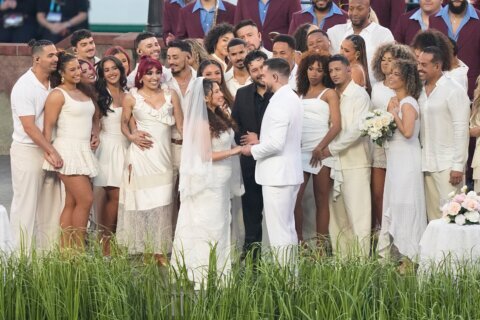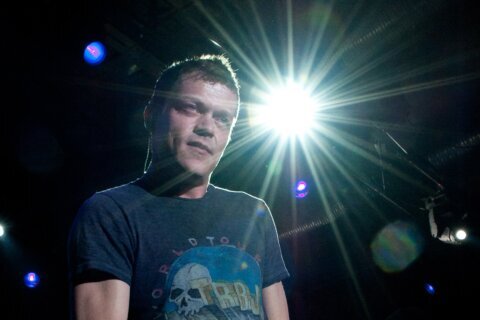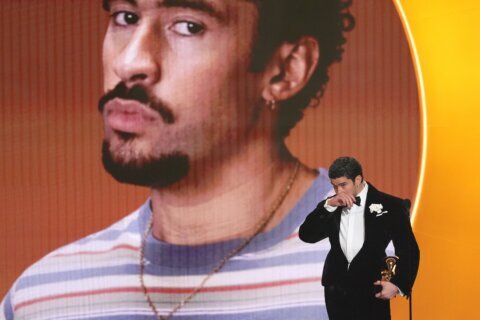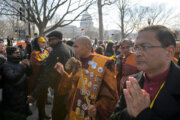Listen to the full interview with B.J. Thomas on our podcast “Beyond the Fame.”
He won an Oscar for his chart-topping hit “Raindrops Keep Fallin’ on My Head” (1970).
On Saturday, five-time Grammy winner B.J. Thomas died of lung cancer at age 78.
“It’s a distinct high point for me,” Thomas told WTOP in 2020. “Actually, the song came out in October of ’69 and it wasn’t until the movie came out as a Christmas release that the radio wanted the record. … By Jan. 3, 1970, it was No. 1, so a great experience.”
He, of course, was referring to the iconic buddy Western “Butch Cassidy and the Sundance Kid” (1969), which won four Oscars, including Best Original Screenplay for William Goldman. The song’s bubbly bicycle scene signals a lighthearted tone.
“They’re riding a bicycle like normal people,” Thomas said. “Mr. Redford said they were making an art film. … The score was different. It wasn’t done with instruments for the most part, it was done with a ‘ba ba ba,’ kind of vocalizing things. … I’ll give it to him. It was kind of an art film, but it was also one of the best westerns ever made, too.”
The lyrics were written by songwriting icon Hal David: “So I just did me some talkin’ to the sun, and I said I didn’t like the way he got things done, sleepin’ on the job.”
“They had asked Hal to write a frivolous song, just kind of a throwaway song, and he said, ‘B.J., I don’t write frivolous songs,'” Thomas said.
“He wrote something that seemingly on the surface was not saying much, but in the long run … it was saying a very meaningful thing that rain falls on you, but if you’re free, nothing’s worrying you.”
David’s lyrics were set to the music of legendary composer Burt Bacharach.
“Burt Bacharach is obviously one of the greatest composers of all time,” Thomas said. “It was a unique melody. I instinctively knew from the get go that his compositions and their songs weren’t stuff that you played with. You needed to sing it as it was written.”
To this day, he’s in awe of the on-screen buddy team of Paul Newman and Robert Redford, who honored the role by lending the name to the Sundance Film Festival.
“It was one of the best buddy films of all time and it’s got a lot of classic lines,” Thomas said. “It’s funny, I just recently read a book by Burt Bacharach. He said he never met Paul Newman, Robert Redford or the director George Roy Hill — and I never have either! I thought over the years I should have at least met those guys.”
He says it almost happened several times, but it never quite panned out.
“I played a couple of times in Park City, one at a private thing where Mr. Redford’s name placement was on a table in front, but he never came,” Thomas said. “Having never met the guys, they’re kind of up there in the idol territory. … But I was involved with him in a wonderful movie, so I do feel like I have met him.”
Indeed, they’re frozen in time together like the final freeze frame, quite the feat for a young boy growing up in Houston, Texas, with a father who listened to country radio.
“My dad loved country music,” Thomas said. “I grew up with the Grand Ole Opry on the radio, but when I was about 12 or 13, I fell in love with Jackie Wilson and Bobby Bland. I was a huge R&B enthusiast. … I’ve just always loved music. They tell me that I sang even when I was an infant. I’ve always loved music, I sung around, I sung in church.”
At age 26, Thomas recorded his breakthrough hit “Hooked on a Feeling” in 1968, which was later covered by Blue Swede with an “ooga-chaka” intro in 1974.
“To be honest, I wasn’t thrilled that somebody had covered my record that soon. … But I don’t think you can deny that it was a beautiful, great production,” Thomas said. “It was a No. 1 record and my buddy, Mark James, wrote it and he made a ton of money off of it, so it’s all good.”
Thomas found another hit with “(Hey Won’t You Play) Another Somebody Done Somebody Wrong Song,” which won the Grammy for Best Country Song in 1976.
“I never really had any country radio play until I did ‘Wrong Song,'” Thomas said. “It was the No. 1 country record as well as the No. 1 pop record.
“I never tried to do any one kind of music in each genre. I just naturally was a product of Top 40 radio, where they played everything on the same station. That’s the way I approached music.”
Thomas just recently turned 78 years old but can’t play due to the pandemic.
“We’re shut down now,” Thomas said. “I had a session scheduled for Muscle Shoals, Alabama, for the 15th of July that we had to put off because of the virus. … We’re gonna do that as soon as we have the vaccine. … No one really knows when we’re going to be free to get out again. It probably looks like the end of the year or next year.”
Looking back at his career, what does he want people to remember about him?
“I hope they think of me as somebody who really believed what he was singing,” Thomas said. “It’s all about soul and emotion to me, so I’ve tried to put that in. I’ve only tried to record things that I really believe in and that I really feel. I just hope that I’m remembered as a good father, a good husband and the music will take care of [itself].”
Still, he would like to correct the record about one thing.
“They always lump me in with these light pop singers and I’ve never looked at my career like that,” Thomas said. ” I think I’ve done some deep, pretty meaningful songs. … I’ve got a lot more value on the effort and the emotion I put into my music than people [today], but that’s music. It’s always about the next guy, who’s new and, hey, that’s the way music is. I like the new guys, too.”
Will “Raindrops” still be played another 50 years from now?
“It could be,” Thomas said. “It’s in the Hall of Fame. It’s in the Grammy Hall of Fame — Mr. Bacharach and Hal and I and the record — so it’s there to be remembered. Music is always changing and good songs will always be good songs. … If it’s remembered, that’s great. I hope it is, but we’ll have to leave that to the future.”
Listen to the full interview with B.J. Thomas on our podcast “Beyond the Fame.”








